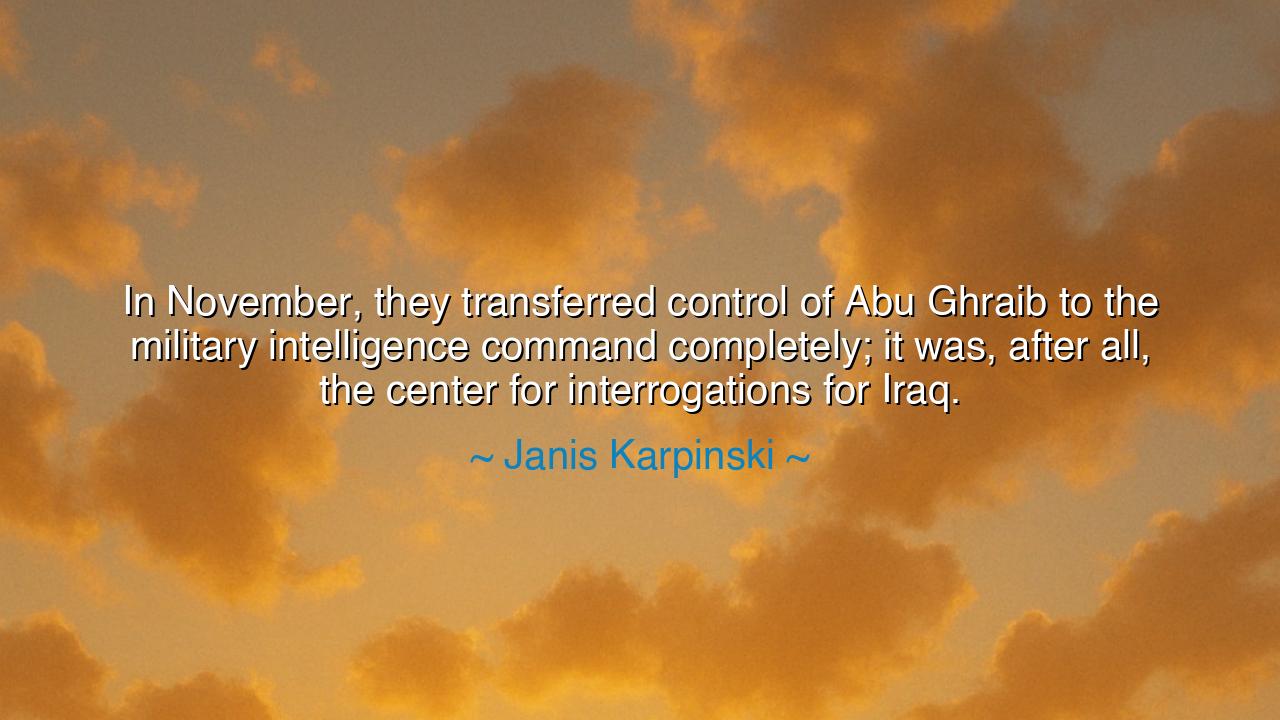
In November, they transferred control of Abu Ghraib to the
In November, they transferred control of Abu Ghraib to the military intelligence command completely; it was, after all, the center for interrogations for Iraq.






“In November, they transferred control of Abu Ghraib to the military intelligence command completely; it was, after all, the center for interrogations for Iraq.” Thus spoke Janis Karpinski, a soldier of conscience, bearing witness to a time when the light of purpose was dimmed by the shadow of power. These words, though spoken plainly, carry the gravity of a fallen world, where the instruments of order become the tools of cruelty. They are not merely a record of transfer and command, but a lament for the soul of those who once sought to liberate and instead found themselves entangled in the dark machinery of domination.
The name Abu Ghraib itself rings like a dirge through history — once a prison under a tyrant’s rule, it became again a place of torment under those who came proclaiming freedom. When control was transferred to military intelligence, it was not simply an act of bureaucratic change, but the moment when secrecy replaced transparency, and interrogation eclipsed justice. It marked a transformation — from prison to crucible, from structure to symbol. It was as though the very soil of the place demanded suffering, and men, forgetting their humanity, became its servants.
This tale is not new in the long story of humankind. The ancients, too, spoke of noble intentions that decayed into tyranny. Consider Athens, that shining city of democracy, which in the Peloponnesian War built the prison of Delium and tortured its own prisoners in the name of survival. Or think of Rome, which began as a republic devoted to law and became an empire consumed by fear, its prisons swelling with dissenters and prophets. So it was then, and so it became again at Abu Ghraib: the iron law of unchecked power, that wherever men wield control without compassion, they become what they once opposed.
Janis Karpinski’s words are not only a statement but a warning — a whisper from within the machinery itself. She stood inside the hierarchy, saw the banners and the orders, and yet spoke of what many would not see. In her testimony lies the voice of conscience, struggling against the tide of obedience. She reminds us that in the world of command and control, the greatest battle is not fought between nations, but within the heart of every soldier, between duty and morality, between silence and truth.
It is easy, in comfort and distance, to judge those who fail to resist the tide. But the ancients knew that power tests the soul more severely than poverty. Even the wise King Solomon, blessed with understanding, fell into corruption when surrounded by excess and praise. The same is true of nations: they begin with the dream of justice, yet if they forget humility, they turn justice into vengeance and righteousness into ruin. Abu Ghraib is but one mirror among many — reflecting what happens when fear replaces wisdom and control replaces compassion.
Let this be remembered, then, not as an accusation, but as a teaching. Power without moral restraint breeds decay; obedience without conscience invites catastrophe. Every generation must guard against this darkness — in the halls of government, in the ranks of armies, in the chambers of their own hearts. For the line between protector and oppressor is thin, and only the vigilant spirit can keep it from fading away.
Therefore, O seeker of truth, take this lesson into your life: when you are given authority, wield it with mercy. When you are asked to follow, do so with your eyes open and your conscience awake. Question not out of rebellion, but out of reverence for what is right. Remember that Abu Ghraib was not born from monsters, but from ordinary men who forgot their limits. And remember always — the true strength of a nation, of a person, of a soul, lies not in control, but in the courage to remain human when the world demands otherwise.






AAdministratorAdministrator
Welcome, honored guests. Please leave a comment, we will respond soon